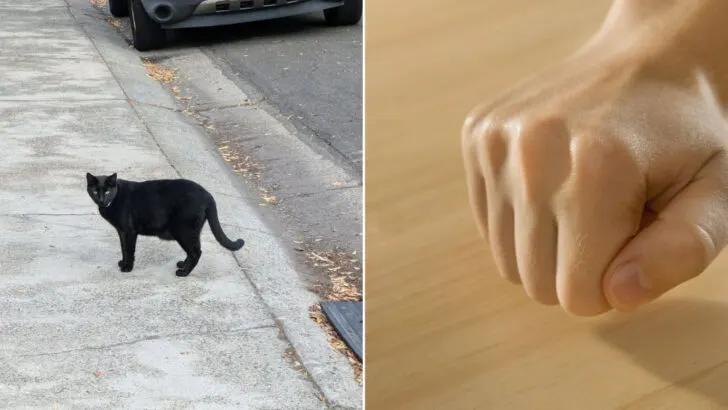Superstitions hold a mysterious charm, often rooted in regional folklore and passed through generations. Although many dismiss them as old wives’ tales, they continue to influence everyday life across the United States. Here are 12 regional superstitions that Americans may secretly believe, even today.
Whistling on a Boat
In coastal fishing towns, whistling aboard a boat is often frowned upon. This old superstition suggests that such an act can “whistle up a storm.” The sound is believed to call forth winds, threatening the safety of the vessel.
Fishermen, known for their pragmatic nature, often heed this cautionary custom. It’s a blend of tradition and respect for the unpredictable sea, rooted in centuries of maritime culture.
Whether embraced for humor or habit, this belief underscores the deep-seated reverence for the ocean’s might.
A Black Cat Crossing Your Path
The sight of a black cat crossing one’s path is often met with unease in rural and suburban America. This superstition dates back to the Middle Ages, where black cats were linked to witchcraft and bad luck.
Today, many still hold an instinctive apprehension, altering their course to avoid potential misfortune. Despite its dark reputation, some cultures regard black cats as symbols of prosperity.
This duality showcases the fascinating contrast of beliefs surrounding these mysterious felines.
Knock on Wood to Avoid Jinxing Things
Across the nation, “knocking on wood” remains a popular ritual to ward off bad luck. Originating from ancient pagan traditions, it was believed that spirits lived in trees.
By knocking, one could invoke their protection. This practice has transcended time, becoming a whimsical habit during conversations.
Aimed at preserving good fortune, it serves as a playful reminder of humanity’s enduring connection to nature and unseen forces.
Tossing Spilled Salt Over the Left Shoulder
In kitchens across America, spilling salt is often followed by tossing a pinch over the left shoulder. This act is thought to thwart bad luck.
Dating back to Leonardo da Vinci’s “The Last Supper,” where Judas spilled salt, it symbolizes betrayal and misfortune. The left shoulder is chosen to blind the devil lurking there.
Even in modern times, this quirky gesture persists, blending culinary mishaps with lighthearted superstition.
Break a Mirror, Get Seven Years’ Bad Luck
The belief that breaking a mirror brings seven years of bad luck is widespread. This superstition originates from ancient Romans who believed mirrors contained the soul.
A broken reflection was thought to damage one’s spirit. The seven-year term echoes Roman ideals of life cycles, marking a period for renewal.
Though some dismiss it as mere folklore, the anxiety at a mirror’s shattering remains a testament to its enduring influence.
Don’t Open an Umbrella Indoors
Opening an umbrella indoors is a taboo in many urban and suburban households. Traced back to the Victorian era, it was thought to offend household spirits or signify impending misfortune.
Practicality also played a role, as umbrellas posed physical hazards in cramped spaces. This belief persists as a playful caution.
While mostly a source of amusement today, it reflects a blend of historical wisdom and modern superstition.
Step on a Crack, Break Your Mother’s Back
The playful rhyme “Step on a crack, break your mother’s back” is familiar across playgrounds and sidewalks. This childhood chant instills a sense of caution and responsibility.
Rooted in the idea that cracks symbolize fractures within family bonds, children diligently avoid them. It’s a game, yet steeped in the underlying fear of causing harm.
This superstition reflects a mix of innocence and the omnipresent worry about family well-being.
Horseshoe “Points Up” or “Points Down”
In rural and farm households, the orientation of a horseshoe is paramount. Hung “points up,” it collects and retains luck, while “points down” allows it to spill out.
This belief stems from the horseshoe’s historical association with protection and prosperity. Farmers, with their ties to the land, often uphold this tradition.
Whether a decorative charm or a genuine guardian, the horseshoe remains a cherished symbol of fortune.
An Owl Calling at Night Means Bad News
In the Appalachian and rural South, an owl’s call at night is an ominous sign. Historically linked to death or bad news, this superstition reflects the owl’s mysterious nature.
Their nocturnal habits and haunting calls have inspired tales of forewarning. Though owls are celebrated in other cultures for wisdom, this belief emphasizes their eerie allure.
A mix of fear and fascination, the owl’s call remains a potent symbol of the unknown.
Don’t Sweep Someone’s Feet or Cross a Broom Over Them
Sweeping someone’s feet or crossing a broom over them is taboo in Southern and African-American folk practices. It is believed to bring misfortune or impede marriage prospects.
This superstition is interwoven with cultural narratives and household etiquettes, symbolizing respect and harmony. The broom, a mundane tool, becomes a conduit of tradition.
Even today, this practice endures, blending cultural heritage with everyday life.
Counting Crows or Magpies
In the Northeast and older rural communities, counting crows or magpies predicts future events. “One for sorrow, two for joy,” begins the well-known rhyme.
This tradition, steeped in folklore, transforms birds into omens. The number seen dictates the day’s fortune, adding intrigue to an ordinary sight.
A blend of rhyme and superstition, this practice highlights humanity’s quest for meaning in nature’s patterns.
A Bird Striking a Window Signals Bad News
In small towns and older households, a bird striking a window is seen as an ill omen. This belief suggests that the impact heralds death or misfortune.
Birds, often regarded as messengers, carry symbolic weight. Their collision with a home signifies a breach in the barrier between worlds.
Though interpretations vary, this superstition underscores the fragile boundary between life’s everyday tranquility and unforeseen events.

